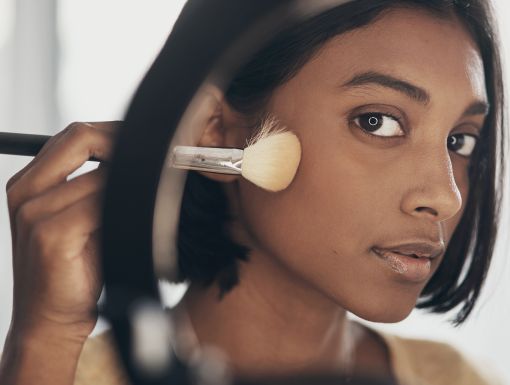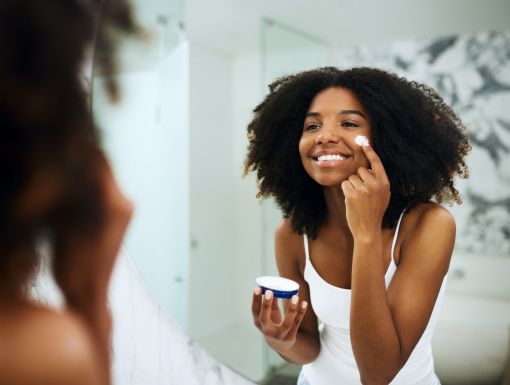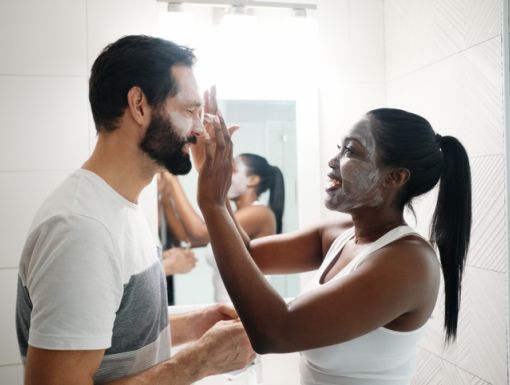
How Do I Build an Anti-Aging Skincare Routine?
For years ‘anti-aging’ skincare products looked like expensive, fancy wrinkle creams tucked behind your local beauty counter. Beautiful, sophisticated packaging with promises to smoothen wrinkles in weeks was previously the standard. The truth is that there is more to anti-aging treatments than packaging, and prevention is paramount to optimal results. It is crucial to familiarize yourself with the active ingredients and science rather than be distracted by what some of these products promise to deliver and cannot.
How does our skin age?
While we cannot stop curbing the physical signs of aging, building a routine to help you age well is possible. Collagen is responsible for plump, youthful skin. As we age, our faces begin to lose collagen, leading to loss of volume. Sun exposure is a significant factor in accelerating the aging process. Even the blue light from cell phones and computers contribute to aging. Excess sun exposure leads to loss of collagen, hyperpigmentation, fine lines and wrinkles.
For your skin to retain its youthful appearance, we must protect it from the sun, decreasing the pace of collagen breakdown and even take steps to increase the collagen content. For this reason, you need several products supported by studies that will combat these issues versus one thick cream promising miracles. You also need to use them consistently. Here are the ingredients and products to look for when building your skincare routine.
Ingredients for hydration
Look for skincare products that have hydrating ingredients like hyaluronic acid, peptides and ceramides. Hyaluronic acid is naturally found in our skin and draws in and seals the surrounding moisture. Hyaluronic acid is the base for the fillers used as cosmetic products to replace the volume of the skin. Look for ingredients that will strengthen the skin’s barrier, such as peptides and ceramides. Ceramides are the naturally occurring lipids found in the top layer of the skin. Products that contain ceramides or peptides are great for reinforcing the skin’s barrier, thus keeping in the moisture.
Vitamin C
If you haven’t used a vitamin C serum, you are missing out on a powerful antioxidant! Vitamin C adds a layer of protection to your skin to fight off free radicals that can damage the skin and are among the greatest contributors to skin and hair aging. This antioxidant also enhances your sunscreen to protect you from harmful UV rays, fade dark spots, boost collagen, even out skin tone and brighten skin. It’s important to note that vitamin C can be unstable if exposed to light, so make sure the serums are in dark or opaque airtight containers. The most potent and stable form of vitamin C is L-ascorbic acid. Look for serums that contain 10% to 15% vitamin C for best results.
Retinol and retinoid
If a product that promises anti-aging benefits does not contain a type of retinoid, then it is probably a waste of money. Retinoid products are derived from vitamin A. Retinoids are the most important anti-aging ingredient because they work by increasing your skin cell turnover. As we age, our skin cells take a longer time to replace themselves with fresh skin. Retinoids speed up this process by exfoliating dead skin cells and bringing fresher skin up to the surface. In the beginning, this can cause irritation, and your skin may become dry/irritated and flake. Speak with your dermatologist to see if a prescription retinoid or over-the-counter retinol is best for you. Your dermatologist might also recommend different prescription strengths based on your skin concern. Apart from increasing skin cell turnover, retinoids also help fade dark spots and prevent acne. However, if you are pregnant, do not use retinoids as they can affect fetal development.
Chemical exfoliation
Since our skin cells take longer to turn over as we age, our face begins to look duller. Chemical exfoliants such as AHAs (alpha-hydroxy acids) and BHAs (beta-hydroxy acids) work by gently removing the top layer of your skin. Common AHAs are glycolic and lactic acid, and a common BHA is salicylic acid. Make sure to exfoliate your skin no more than two times a week. Anything more can cause severe irritation.
Sunscreen all day, every day
Now that we have covered the best anti-aging ingredients to incorporate into your routine, we need to talk about the most important product of all, sunscreen. A proper skincare regimen can range from affordable to expensive. You must make use of all the products for the best results. The ingredients we have mentioned will not work if you aren’t applying an SPF 30 or above every day. Sunscreen isn’t just for the beach or days when you know you will be outdoors. You should be applying and reapplying sunscreen even if you are sitting inside near a window. As stated above, sun exposure is the number one factor that causes fine lines and wrinkles. The best way to help your skin age gracefully and prevent skin cancers is by protecting it from the sun.
The best sunscreen is the one that will make you want to wear it every day. There are many types of sunscreen that are incorporated into skincare products, such as facial moisturizers. There are sunscreens for everyone, including patients with darker skin. These sunscreens contain iron oxide pigments, and they can also block blue light, which leads to hyperpigmentation. Many prefer to use the more common mineral sunscreen, which works by using minerals such as zinc oxide or titanium dioxide to form a physical barrier to reflect the sun’s rays.
When should I start using an anti-aging routine?
The beauty about a skin routine is that it’s not really about ‘anti-aging’ but aging well. The best way to age well is to take preventative measures. This means you can start any time. The most important thing is not to get caught up in doing everything at once. Not everyone has the same skin type or concern, so your regime will look different whether you are in your teens, 20s, 30s, 40s, etc. I encourage you to speak with your dermatologist about your concerns, and they will be happy to direct you to the right products.



